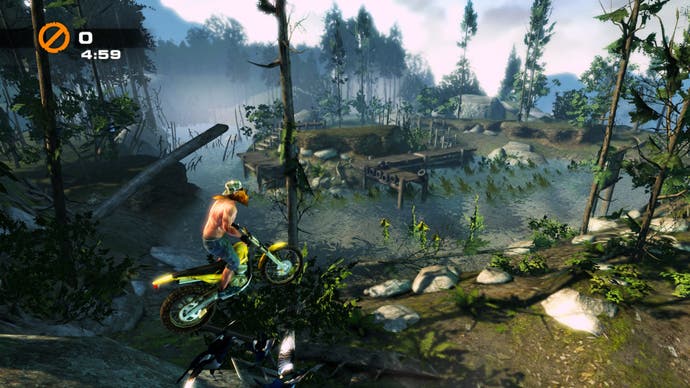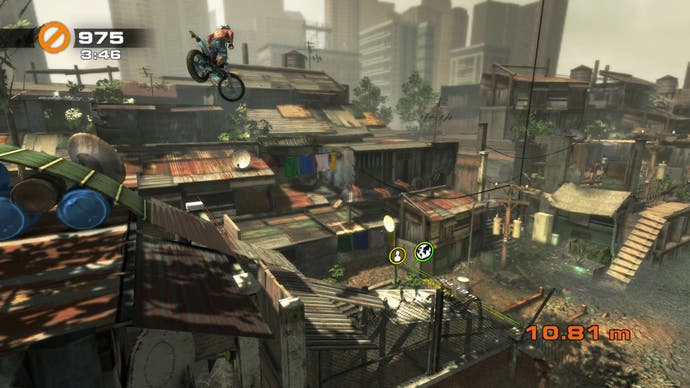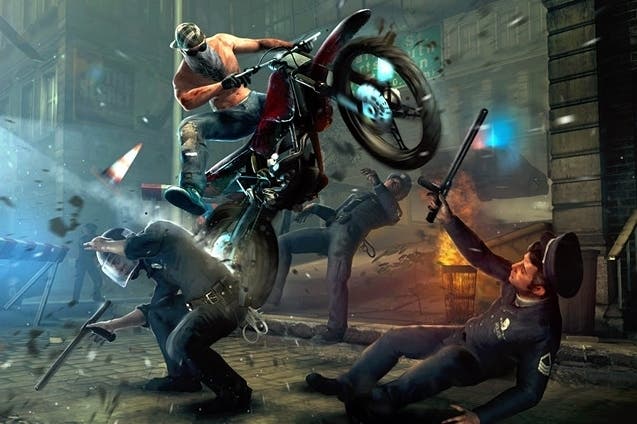Is PSN's Urban Trials more than a Trials rip-off?
"I can't say that we weren't inspired by it in some way."
If imitation really is the sincerest form of flattery then it's highly likely there was a swell of blushing cheeks in RedLynx's Helsinki office when Urban Trials was properly unveiled last year. A side-scrolling race against the clock that hurls a motocross bike through a series of improbable obstacles, it's not exactly hard to pinpoint where Polish developer Tate Media got the idea for its PSN-bound game.
"We've played Trials HD, although we haven't really played Trials Evolution," confesses Tate's general manager Wojtek Bilinski. "I can't say that we weren't inspired by it in some way. But we also played a lot of other Trials games from the '80s and '90s."
It's true that RedLynx didn't really invent the genre - Sega arguably got their first with 1976's Moto-Cross (a game that, in what remains one of the most bizarre tie-ins, was rebranded as Fonz in deference to the Happy Days character) while Miyamoto defined the genre with Excitebike - but they're most definitely the masters of it.
RedLynx is also responsible for bringing a slightly punky, anarchic vibe to the art of staying on two wheels, and that's writ large all over Tate's own game. The Trials part of the equation is obvious enough, and the Urban comes through in the downbeat backdrops. This isn't exactly the fantasy of Evolution, and it's more the low-rent, abandoned spaces that framed earlier Trials games.

Urban Trials isn't entirely without its own sense of character, though. Levels are packed with cute little pieces of incidental detail - spectators cheer you on or, rather less helpfully, hurl explosive barrels in your direction, while policeman clamber out of the way, their cars sometimes screeching to a halt just before they impede on your path.
There's often a more coherent sense of place as well, and a willingness to do fun things with it. One jaunt through a funfair in the short five-level demo that's currently available winds up across a broken rollercoaster before eventually crashing through a ghost train, complete with cut-price scares and an acknowledgement of the game's own silliness.
Right now, though, it all falls apart in the hands. "What we did," Bilinski says as he points out the differences between Trials and his own game, "it's a different game in terms of physics, and it's a different game in terms of gameplay. When you have contact with the game, you'll find that it's not that hard at the beginning. It's in such a way so that casual players will have great fun and won't get that frustrated - and still there's a challenging game there."
He's right in some regards. Urban Trials, for all of its cosmetic similarities, feels very, very different from RedLynx's games. Whereas they boast vehicles that demand exquisite accuracy, here the tools are somewhat blunter - there's a smothering of assists that suggest Tate doesn't have quite enough faith in its own physics, and the result is a ride that feels overly restrictive. Huge leaps are swallowed unconvincingly by spongy suspension, and it's near-impossible to flip the bike end-to-end on anything less than an epic jump.

It feels wrong, however, to chide Urban Trials for being so similar to Trials with one hand and then berate it for not being similar enough with the other. But the truth is that these are hands spoilt by the delicacy of RedLynx's game. Perhaps on the platforms where Urban Trials is headed that'll be less of a problem, and perhaps over the course of its plentiful levels Tate's own take on the genre will come into its own.
Meanwhile, Vita owners will likely be grateful for a little slice of something bespoke, even if it's not wholly original. "The game is really designed for Vita - it's a side-scrolling game, there's a widescreen, it's focused on simple mechanics and design. It's just a motorbike and physics. It's got online features, so there's competitive stuff. In terms of the game's launch, I think it's nice for handheld platforms," says Bilinski.
"I think the platform's great. But you know, everyone knows the strength of the Vita, and it should be bigger, because it's a really good platform, but there's a lot of competition in terms of phone games. Vita's got a great screen, it's really powerful, and surely it's possible to make great games for this."





.png?width=291&height=164&fit=crop&quality=80&format=jpg&auto=webp)



